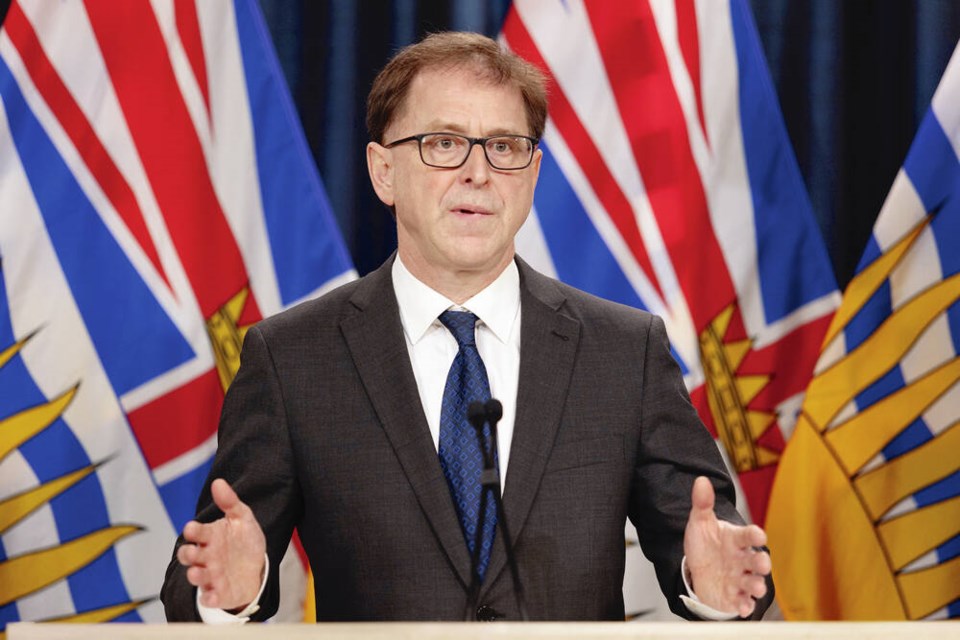Amelia Johnston has been on a waiting list to get a family doctor in the Victoria area for the better part of a year.
The 31-year-old, who has Lyme disease, polycystic ovary syndrome and hypothyroidism, signed up for the Health Connect registry out of desperation last year after she was unexpectedly dumped by her family doctor.
News that the province is expanding the Health Connect patient roster in the hopes of attaching more people to a family doctor has Johnston skeptical.
“The more people on the list, the longer it will take,” she said, as patients compete for a Limited pool of family physicians.
During a news conference Wednesday, Health Minister Adrian Dix touted the expanded Health Connect registry — which will now be available in all areas of the province — as a way to match patients with the hundreds of family doctors who have been added to the health system in the last year.
Dix said the overhauled payment model has lured at least 600 doctors to family practice from elsewhere in the health-care system and 156 family doctors have been hired through the province’s new-to-practice incentive program.
People will be connected to a doctor or nurse practitioner in their area based on their health needs and the health-care provider’s ability to take on that patient. The province will know which doctors and nurse practitioners are taking on patients thanks to a second registry for individual primary-care providers.
That will give the Health Ministry a “comprehensive list of who’s looking for a primary-care provider, who already has one and which providers and clinics can accept patients,” Dix said. “And we use that information to actively support connections between patients and primary care.”
When asked how long people can expect to wait to be matched with a family doctor through the registry, Dix admitted: “It’s going to take some time.”
Rita McCracken, a Vancouver-based family doctor and assistant professor in the University of B.C.’s department of family practice, welcomes an expansion of the Health Connect system but worries it will exacerbate inequities for people who don’t speak English or marginalized people who might have trouble registering online.
She also worries it could give people false hope that they’ll suddenly be matched with a doctor.
“This is going to be helpful. It’s a step in the right direction, but it’s not going to answer all the problems,” McCracken said. “And it’s possible that it’s going to make people more frustrated. If you put your name on that list, and then it takes three years to get a family doctor, that doesn’t seem like progress.”
B.C. United party health critic Shirley Bond said she supports a provincewide database for patients but the expansion will be little comfort for “British Columbians who have been sitting on that wait-list for years.”
Bond slammed Dix for not providing more information on where in the province the hundreds of new doctors are practising or whether they’re accepting new patients.
“Where are those doctors?” asked Bond, the MLA for Prince George-Valemount. “We know there is a shortage of physicians across British Columbia and we know that it’s historically harder to recruit and retain doctors in more Northern, and rural communities. So where those doctors have been added actually matters.”
Right now, many British Columbians trying to find a family doctor cold-call clinics looking for an opening.
Several other provinces already have centralized databases for family physicians or patients.
Alberta’s College of Physicians and Surgeons operates a provincewide database that lists contact information for all licensed physicians and physician assistants who specify if they’re accepting new patients. People can use search criteria to find family physicians based on location, specialty or language and it’s then up to them to contact the doctor’s office directly.
Ontario’s Health Ministry said 88 per cent of the people who sign up for its connect program are connected with a family health-care provider. The system gives priority to people with urgent health-care needs.
The family doctor shortage in B.C. has forced people to turn to walk-in clinics or overcrowded emergency rooms where physicians have raised the alarm about unsafe conditions.
Dix said the number of people without a family doctor in B.C. — pegged at 980,000, according to the Canadian Community Health Survey — has dropped to 895,000, according to more recent survey data.
A total of 3,300 physicians, or about 65 per cent of those working in family medicine, have switched to the new fee structure, which has been billed as a way to stop those in family practice from fleeing a system that was burning them out.
Family doctors are no longer paid on a fee-for-service model that disregards the severity of a patient’s health issues, rather based on a formula that includes the number of patients seen in a day, the number of patients attached to their practice, the complexity of the patients’ issues and their office overhead costs.
People in B.C. can register themselves and their families online to get a primary-care provider through the Health Connect Registry at healthlinkbc.ca/health-connect-registry. Anyone who needs assistance or translation services can call 811.



